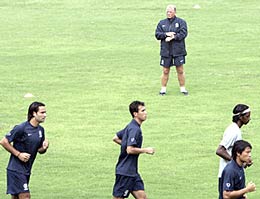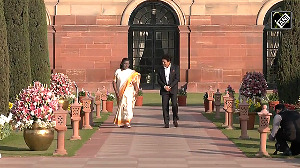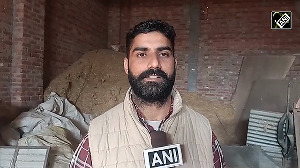Indian soccer coach Bob Houghton looked skyward and then towards the training ground at the national team's camp on the outskirts of capital New Delhi.
"I hope there is some rain soon, the ground is very hard for the players," said the Briton, hoping for a downpour to help ease the conditions.
The weather could be the metaphor for Indian soccer, which hopes for a revival although it needs to surmount the kind of vagaries linked with the country's annual rainy season.
The twice Asian Games champions have been in a slump since the mid 1970s, mainly due to poor administration, while current continental giants such as Japan and South Korea made the most of a professional approach.
The All India Football Federation is now showing urgency to revive the game in a cricket-mad country where a booming economy is attracting interest from sponsors and the global administrators of the game alike.
The AIFF roped in the experienced Houghton last year to lift the team, ranked 161st in the world and are scheduled to launch a professional league by the end of September.
However, there are many issues which need to be tackled.
The poor ranking is blamed on the lack of international friendlies. Clubs are reluctant to free players for national duty fearing injuries, while infrastructure and grassroots development are almost absent. The 58-year-old Houghton, who has had successful stints in Europe and Asia, has pleaded with clubs to ease the burden on national players to help rebuild the team.
RESTRUCTURING GAME
 Leading striker Baichung Bhutia echoed Houghton's sentiments in calling for the game to be revamped in India.
Leading striker Baichung Bhutia echoed Houghton's sentiments in calling for the game to be revamped in India.
"It is a very good sign," he told Reuters at an ongoing national camp for an exposure trip to Portugal later this month followed by a six-nation tournament in New Delhi.
"This is the time we need to restructure our system," the striker said. "There is lot of interest from corporate houses, lot of people are getting into the game.
Bhutia, who played for Bury in England for two seasons a few years ago, has been a national player for a decade.
"We need to have good youth development programmes and should start generating a fan base," he said.
"There are ways to do it, but how they do it is up to the clubs.
"Clubs provide player salaries but on the whole, I think the motive has to be the development of the game for the country."
SLEEPING GIANT
FIFA president Sepp Blatter described India as a "sleeping giant" during a visit in April, comparing the country with the United States.
"Similar to the US, football is not the number one sport in India, but education of public, disciplined efforts and respect will definitely improve the game," Blatter said.
Experts agree the national team's improved performance would be vital to tap growing corporate support.
Last month, India's diversified Essel Group launched a club in Mumbai at an investment of $1 million while an arthouse has taken over a local club in New Delhi.
Former India goalkeeper Henry Menezes, who heads the newly formed Mumbai FC, said it would also help tap young talent and build a senior team.
"About 450 schools play football in Mumbai alone," he told Reuters.
"Indians are not very sound with their first touch, so we'll educate coaches which will benefit a large number of people."
Menezes said clubs needed to back the national team but the federation should also reward India players and share the responsibility of supporting them.
"Players also need to show more accountability," he said. "Today, the accountability is only with the clubs.
"Unless the national team performs, the clubs are not going to benefit."








 © 2025
© 2025